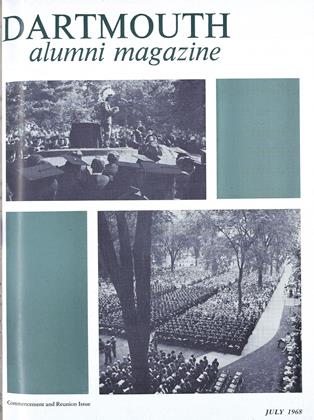By Richard Eberhart'26. New York: Oxford University Press,1968. 88 pp. $3.75.
"... words are diamond drills! See, they break down the world. They enforce a bright powder.
Relying upon nothing but excellence and essence of spirit.
Then the world is cemented fast in the palm of knowledge.
The tree is new seen, the river new seen. And Bright leaps of imagination strengthen the universe."
If so various a poet as Richard Eberhart can be disciplined to a credo, this might well be his. It occurs in the first poem of his newest book, Shifts of Being. Through words, he writes, "The veils are drawn away from the eyes,/The moments of splendor come to mind again."
This small, deeply personal book brings together 55 new poems. It reads easily, but Mr. Eberhart's simplicity is deceptive. The reader is suddenly caught by deeper, less obvious meanings under the limpid verse. The poet has a special grace that builds small incidents into large significance: his rescue of a chipmunk from a cat moves through five Emersonian stanzas to become "The Vastness and Indifference of the World."
In some not unimaginable future an industrious scholar may work to reconstruct the poet's life from his writings. The clues are all there. Death and beauty have been companions to his mind since his youth when he watched the long pain of his mother's dying. "Whenever I see beauty I see death/because she died when she was beautiful," he writes, still wounded 40 or more years later. In one of the longer poems in this new book he celebrates the Boston of his young manhood, then dreams back "to the Cedar River of my youth/My beginnings far inland, far away from Boston." He is now in that shift of being when "One flashes back to the safety of childhood,/To that strange place where one had first begun."
That place was Austin, Minn., where his childhood was securely affluent until the failure of his father's firm. Then came his mother's death in 1922 when he was just eighteen and entering college. From the University of Minnesota he transferred to Dartmouth, graduating in 1926. After three years of adventure in the Orient (he shipped as a steamer hand), he entered St. John's College, Cambridge University. During these years he began to teach, as tutor to the son of the King of Siam, and published his first book, A Bravery of Earth. Years of teaching and writing ensued, and in 1956 Dartmouth called him home to be Poet-In- Residence and Professor of English. Long before, the major awards had begun: The Shelley Memorial Prize, the Harriet Monroe Award, recognition by the National Institute of Arts and Letters, and an honorary Litt.D. from Dartmouth in 1954. His Collected. Poems: 1930-1960 won the Bollingen Prize from Yale in 1962; Selected Poems:1930-1965 the Pulitzer in 1966. From 1959-61 he was Consultant in Poetry to the Library of Congress and he is currently an Honorary Consultant in American Letters.
Eventually, the teacher must retire. The poet, never. When that time comes for Professor Eberhart let someone quote from poet Eberhart:
"Nothing is so magnificent As the full mind, stored with summers. With age approaching, The sun standing over the horizon, Wonders yet unknown, love not refusing, The world all a visionary Guess, unspent clarity."
Mrs. James Dow McCallum, a Hanovernewspaper columnist, is a close student ofmodern American and English literature.
 View Full Issue
View Full Issue
More From This Issue
-
 Feature
FeatureNon-Violent Change in Our Society
July 1968 By THE HON. JACOB K. JAVITS, LL.D. '68 -
 Feature
Feature"People as Well as Things"
July 1968 By HARVEY P. HOOD '18 -
 Feature
FeatureThe Senior Valedictory
July 1968 By JAMES WITTEN NEWTON '68 -
 Feature
FeatureHONORARY DEGREE CITATIONS
July 1968 -
 Feature
FeatureReunion Week: Fun Plus Education
July 1968 -
 Feature
FeatureCouncil Honors Three Alumni
July 1968
MARGARET BECK MCCALLUM
-
 Books
BooksTHAT GIRL OF PIERRE'S,
December 1948 By MARGARET BECK MCCALLUM -
 Article
ArticleIt's a Small Town . . . With a Large Legacy
JANUARY 1964 By MARGARET BECK MCCALLUM -
 Feature
FeatureDartmouth's First Lady
NOVEMBER 1965 By MARGARET BECK McCALLUM -
 Books
BooksDEBRIS.
NOVEMBER 1967 By MARGARET BECK McCALLUM -
 Article
ArticlePeriod Furnishings Sought for Dan'l Webster Cottage
November 1968 By MARGARET BECK MCCALLUM -
 Feature
FeatureWarner's 41 Dramatic Years
MAY 1969 By MARGARET BECK McCALLUM
Books
-
 Books
BooksFaculty Articles
April 1956 -
 Books
BooksAlumni Articles
DECEMBER 1967 -
 Books
BooksUNDERCLIFF. Poems 1946-1953.
May 1954 By ALEXANDER LAING '25 -
 Books
BooksWARSHIPS OF THE WORLD
October 1944 By Herbert F. West '22 -
 Books
BooksSEVENTY NEW POEMS.
JANUARY 1969 By JOHN HURD '21 -
 Books
BooksPREPARATION FOR CHILDBIRTH: A LAMAZE GUIDE.
OCTOBER 1971 By JOHN S. LYLE '34, M.D.


